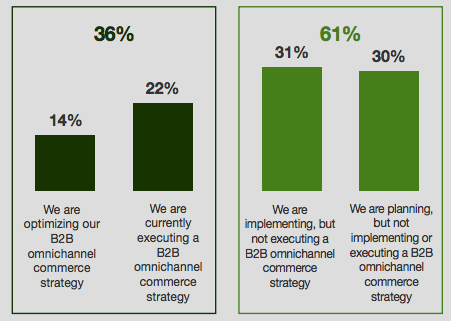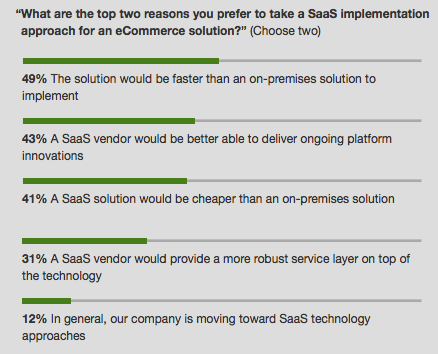
Get your FREE 30-day trial.
Please complete all fields.
B2B buyers want the same intuitive, self-service experiences they receive in the B2C world. And many will shift their loyalties to the sellers that meet these needs.
According to a new Salesforce-commissioned study by Forrester Consulting, B2B buyers say that omnichannel investments lead to greater buyer satisfaction and loyalty. Fifty-six percent of respondents said that buyer satisfaction will suffer if they fail to meet customers on their own terms, with 50% reporting that they believe customers would turn to their competitors. Today, one in four B2B organizations say their primary business objective for implementing online commerce is to improve buyer satisfaction.
Forrester estimates that B2B ecommerce in the U.S. will reach $1.2 trillion by 2021, or 13% of all B2B sales.
What’s behind this enormous growth? Below are three main findings from our study, and why we believe that B2B sellers need to make ecommerce a key part of their growth strategy.
In a world where B2B ecommerce is becoming mainstream, companies must implement omnichannel solutions that serve customers when and where they want, with seamless integration across all channels and devices.
The push for channel expansion is apparent across the B2B sector. Seventy-three percent of B2B businesses sell through an ecommerce or online sales portal today, and B2B businesses say an average of 27% of their revenue comes from digital channels.
However, leading organizations are prioritizing their digital investments to streamline interactions with customers across all channels. In fact, 36% of organizations execute or optimize their omnichannel strategies, while 61% are planning or implementing one soon.

To successfully execute an omnichannel strategy, you need support from all levels of your organization including IT, logistics and especially a top-down cultural embrace of omnichannel initiatives. Many businesses struggle to check all these boxes.
While B2B companies realize the importance of investing in omnichannel selling strategies, many are not quite ready to fully evolve. The biggest obstacles for most firms lie with inefficient processes, lack of skilled staff, and failure to invest in the right technology.
Forty-eight percent of B2B sellers said they have the staff and skills necessary to execute omnichannel strategies, and 41% said the same about clearly defined responsibilities and processes. Even worse, only 40% say they have the tools and platforms necessary to execute omnichannel strategies.

Before diving into an omnichannel investment, ask yourself if your team is properly skilled to handle new tools and processes, and if you have the right tools in place to handle a technological overhaul.
Despite potential gaps in culture, processes, and technology, B2B organizations are optimistic about the potential effectiveness of their omnichannel commerce strategies. Eighty-three percent of B2B organizations say they expect to increase the volume of ecommerce sales over the next three years.

Start with cloud tools that allow you to evolve with your customers’ expectations. Forty-three percent say SaaS solutions are able to do just that, and 49% say they execute solutions faster.

Your business is constantly evolving. Your digital commerce strategy should too. Download the full B2B Embraces Its Omnichannel Commerce Future report.